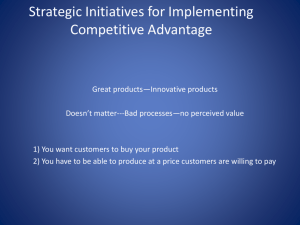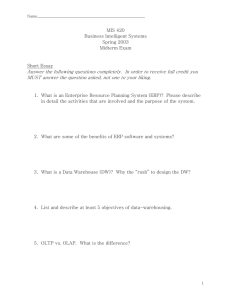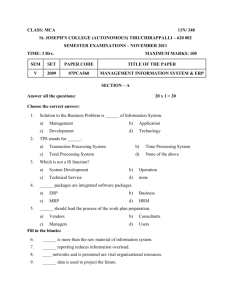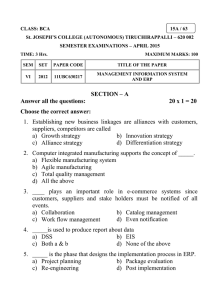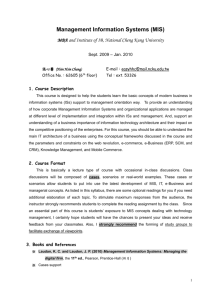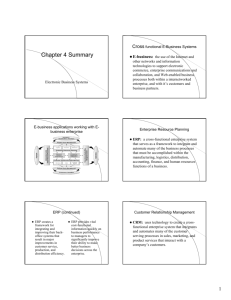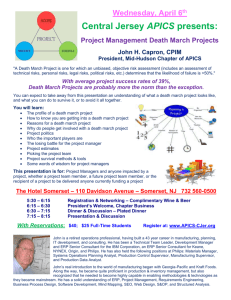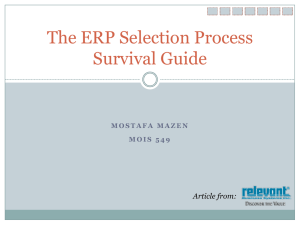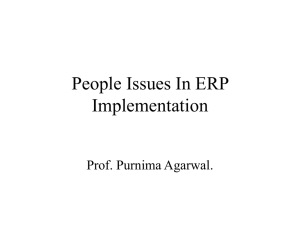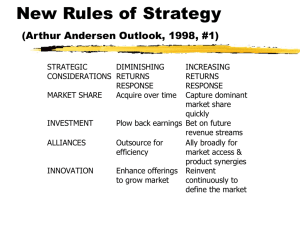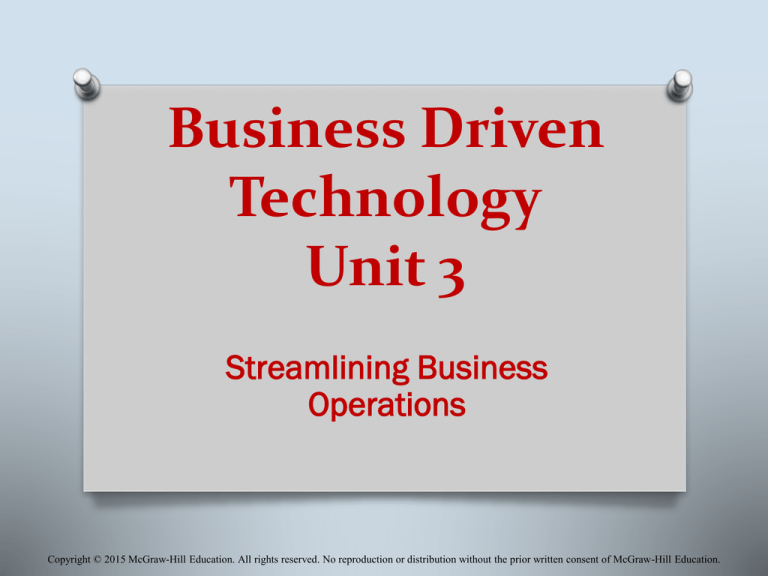
Business Driven
Technology
Unit 3
Streamlining Business
Operations
Copyright © 2015 McGraw-Hill Education. All rights reserved. No reproduction or distribution without the prior written consent of McGraw-Hill Education.
Unit Three
O Chapter Nine – Enabling the Organization –
Decision Making
O Chapter Ten – Extending the Organization –
Supply Chain Management
O Chapter Eleven – Building a Customer-centric
Organization – Customer Relationship
Management
O Chapter Twelve – Integrating the Organization
from End to End – Enterprise Resource Planning
12-2
Chapter 12
Integrating the Organization
from End to End—Enterprise
Resource Planning
LEARNING OUTCOMES
1. Describe the role information plays in
enterprise resource planning systems
2. Explain the business value of
integrating supply chain management,
customer relationship management,
and enterprise resource planning
systems
12-4
Enterprise Resource Planning
O At the heart of all ERP systems is a database,
when a user enters or updates information in
one module, it is immediately and
automatically updated throughout the entire
system
12-5
Enterprise Resource Planning
O ERP systems automate business processes
12-6
Bringing the Organization Together
The Organization Before ERP
12-7
Bringing the Organization Together
The Organization After ERP
12-8
The Evolution of ERP
12-9
Integrating SCM, CRM, and ERP
O SCM, CRM, and ERP are the backbone of e-
business
O Integration of these applications is the key
to success for many companies
O Integration allows the unlocking of
information to make it available to any user,
anywhere, anytime
12-10
Integrating SCM, CRM, and ERP
O General audience and purpose of SCM, CRM and ERP
12-11
Integration Tools
O Many companies purchase modules from an
ERP vendor, an SCM vendor, and a CRM
vendor and must integrate the different
modules together
O Middleware
O Enterprise application integration (EAI) middleware
12-12
Integration Tools
O Data points where SCM, CRM, and ERP integrate
12-13
Core and Extended ERP
Components
O Core ERP component – traditional
components included in most ERP systems
and they primarily focus on internal
operations
O Extended ERP component – extra
components that meet the organizational
needs not covered by the core components
and primarily focus on external operations
12-14
Core and Extended ERP
Components
12-15
CORE ERP COMPONENTS
O Three most common core ERP components
1. Accounting and finance
2. Production and materials management
3. Human resource
12-16
CORE ERP COMPONENTS
O Accounting and finance component –
manages accounting data and financial
processes within the enterprise with
functions such as general ledger, accounts
payable, accounts receivable, budgeting,
and asset management
12-17
CORE ERP COMPONENTS
O Production and materials
management component
– handles the various
aspects of production
planning and execution
such as demand
forecasting, production
scheduling, job cost
accounting, and quality
control
12-18
CORE ERP COMPONENTS
O Human resource component – tracks
employee information including
payroll, benefits, compensation,
performance assessment, and
assumes compliance with the legal
requirements of multiple jurisdictions
and tax authorities
12-19
Extended ERP Components
O Extended ERP components include:
O Business intelligence
O Customer relationship management
O Supply chain management
O Ebusiness
12-20
Extended ERP Components
O Ebusiness components include elogistics
and eprocurement
O Elogistics – manages the transportation and
storage of goods
O Eprocurement – the business-to-business
(B2B) purchase and sale of supplies and
services over the Internet
12-21
ERP Benefits and Risks (Costs)
O Common ERP benefits
1. Integrate financial information
2. Integrate customer order information
3. Standardize and speed up manufacturing
processes
4. Reduce inventory
5. Standardize human resource information
12-22
LEARNING OUTCOME REVIEW
O Now that you have finished the
chapter please review the learning
outcomes in your text
12-23

